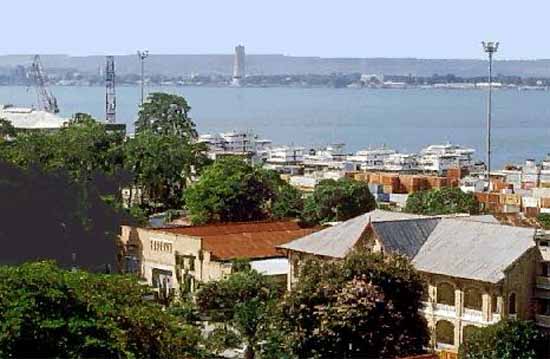
Katherine “Kari” Bachman was a Peace Corps Volunteer in Zaire
Katherine “Kari” Bachman ’88
Zaire, 1988–1990
Nutrition Education Program coordinator/
Food and Society Policy fellow
Extension Home Economics Department
New Mexico State University
Work focus and Swarthmore influence: “In Zaire—now the Democratic Republic of the Congo—I worked as an aquaculture extension agent. I lived in a remote village and rode a motorcycle around the region to provide technical assistance to about 20 male farmers on all aspects of raising tilapia [an African fish often raised for food] in hand-dug freshwater ponds. I told the Peace Corps recruiter I would go anywhere and do anything except teach English. I felt very strongly that I didn’t want to export our consumption-crazed culture to other countries. As for my interest in agriculture, that really only came out my senior year, when I took a class in food policy. It was so intriguing to make the connections between health, food, agriculture, and my major in political science.”
Challenges and rewards: “It was challenging to promote a technology that, though low tech, required an extraordinary amount of hard work and long-term commitment on the part of the farmers. This made it inaccessible to most Zaireans, and I often wished I could work with a program that engaged a wider range of community members. I got my first taste of working for a bureaucracy, and I must say that I’ve gotten better at it over time! I almost majored in linguistics—I am that intrigued by language—and so perhaps the most satisfying personal reward was learning a Bantu language. For months, I would be out in the bush speaking nothing but Kikongo, and I never tired of its subtle beauties. One day, an older woman responded to my ‘How are you?’ with the answer, ‘Mono ikele mwa ndambu ya mbote fioti kaka,’ which, translated roughly, means, ‘I’m only just a little tiny bit well.’ That was as close to complaining as most Zaireans would get. Their warmth and dignity in the face of overwhelming challenges was awe inspiring.”
Impact of PC experience: “I had already lived and worked overseas when I became a volunteer, so I’m not sure PC had as great an influence on me as it did on some of the other volunteers. To this day, I continue to seek out other cultures, including those within the United States, and still feel an obligation to work for tolerance and social justice. For the past five years, I’ve been a statewide nutrition education coordinator with the Cooperative Extension Service in New Mexico. Our program helps limited-resource adults and kids maintain their food traditions, while also teaching them skills to improve their health and save money on food. One of my main goals now as a Food and Society Policy fellow is to strengthen the linkages between all facets of the food system. For example, I’m involved with several groups at the state and local levels that are working to improve the nutrition environment in the schools. One way is to get more locally produced food served there.”
PC choice for others: “My answer to this question has evolved over the years. Peace Corps offers an incredible window onto parts of the world that we otherwise can’t experience so intimately. But it’s also an arm of the U.S. government, and that’s a real challenge for lots of Swarthmore grads, as it was for me. As time has gone by, I’ve become more grateful for my Peace Corps experience. It taught me to have patience and to look for cracks within dominant systems where change can occur. I feel that the challenge is to find and cultivate the good in all people. Discovering common ground makes it possible to change many institutions from within. It’s been so interesting to get a master’s in extension education and then work here in the Agriculture College. On the surface, you’d think I wouldn’t have much in common with the ranching culture, but building on common values has brought our program some real successes that wouldn’t have been achieved if I’d clamored loudly for them as an outspoken liberal....
“Organic famers ... don’t always know what’s best.... We need everyone to come to the table!”
